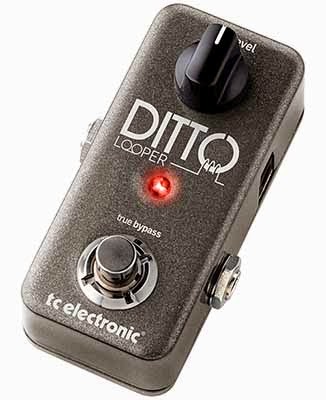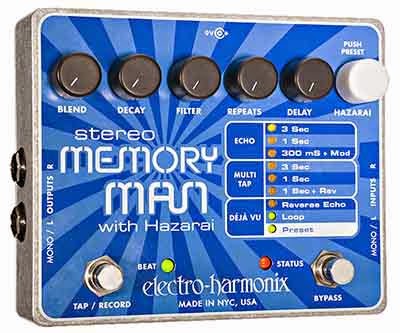As you will know if you've seen me live or watched some of my YouTube vids, I do a lot of looping. Performing with a loop pedal gives another dimension to my solo performances and I wouldn't be without the looper now!
For about 5 years I've been using the Boss RC-20XL, but I've finally upgraded to the newer RC-30. When I was choosing my pedal, I watched a few YouTube videos to help me decide - some of which were helpful, and some of which were less helpful. So I thought I'd do my own video, concentrating more on live performance, and adding my own thoughts. Hopefully it's helpful for someone in a similar position to me, looking to upgrade their looper. Here's my "out-of-the-box" first impressions video, and a longer review of the pedal is below:
For about 5 years I've been using the Boss RC-20XL, but I've finally upgraded to the newer RC-30. When I was choosing my pedal, I watched a few YouTube videos to help me decide - some of which were helpful, and some of which were less helpful. So I thought I'd do my own video, concentrating more on live performance, and adding my own thoughts. Hopefully it's helpful for someone in a similar position to me, looking to upgrade their looper. Here's my "out-of-the-box" first impressions video, and a longer review of the pedal is below:
I've now used the RC-30 out on the road a couple of times, and it's already improved my live performances massively! A huge thumbs up for this piece of kit - even after just two shows I feel like I couldn't do without it. It's very easy to use - you can use it as a simple one track looper, or get a bit more in depth with the dual tracks for some more advanced looping. Here's a few thoughts on the pedal from my personal perspective as a performing solo guitarist/singer.
Which loop pedal to choose?
Loop stations are massively popular these days, and pretty much everyone knows about looping now, largely thanks to Ed Sheeran! I started using a looper about 8 years ago after watching this performance and went through a couple of pedals before sticking with the Boss RC-20XL. At the time, the Boss unit was the most solid and reliable unit I tried, and it had the bonus of a microphone input.




- reliability/build quality
- ease of use
- functionality
- sound quality
The first point in particular was my main reason for getting the RC-30. I've spoken to some fellow guitarists and read a few reviews, and the reliability of some other loopers seemed to be an issue. The one thing that everyone seemed to agree on was that the Boss gear is built to last - and if my old RC-20XL was anything to go by, that's definitely true. I gigged that thing into the ground, and it never failed on me - I really need to be able to rely on my loop pedal, so I went ahead and ordered the RC-30.
The RC-30 - Out of the box
Before I get to the unboxing, a quick shout out for woodbrass.com. Since I'm in the UK, the pound is very strong against the Euro at the moment so it's much cheaper to order gear from Europe. I'd never tried Woodbrass before, but their prices seemed good - and they included a free Boss PSU for the pedal. I've ordered gear from thomann.de before which has arrived with a European plug, so I checked with Woodbrass, and they send out a UK adapter with their orders. My order was delivered within a week of ordering - well packaged, with free delivery - and yes there was a UK adapter for the PSU. Brilliant service!
 |
| Going loopy |
No one bothers reading instructions, so let's plug it in and see what happens. My first thought was "damn, they've sent me a faulty unit" because I couldn't get any life out of it. It turns out that you have to insert a jack into the output on the back of the pedal before it will fire up. I guess they've done this to preserve battery life if using batteries.
Sounds good
The first thing I notice is the improvement in sound quality over the RC-20. The instrument input is clear and crisp and on recording my first loop, the playback sounds identical to the signal. There was always a slight degradation with the old pedal, so I'm really pleased they've improved the preamps. Plugging a microphone into the RC-30 doesn't fill you with dread in the way that the RC-20 did. An XLR input is now added, rather than a jack. Recording a vocal loop is much better than the old pedal - but let's qualify that by saying that that the RC-20's mic preamp was barely useable. I did used to use it, but it was always muffled and pretty awful.
 |
| Shure SM58 plugged into the RC-30 |
Overall - sound quality is vastly improved over the RC-20. I've been using it live to build guitar and vocal loops and it's good - gives me much more confidence than the older pedal. Like I say though, I really wish they'd included a simple 3-band EQ on that mic input, or just a low cut button would've been better than nothing.
Usability
It's easy to get up and running quickly with the RC-30. Plug in, hit the left pedal to record a loop and hit it again to playback. The first thing you'll notice if you're used to the RC-20 like me is that the loop instantly starts overdubbing when you start playback. It took me a few goes to get used to this, but it will be second nature before long. It's a better way of looping because you can instantly start building your loop up - great in live situations.
 |
| Testify! |
Anyway, back to the RC-30...
So, yep, nice and easy to use straight out of the box, and the second thing I notice is that the pedal is lovely and responsive. The old RC-20XL had a really annoying trait whereby there was a tiny delay after hitting the playback button when you record your first loop. I'm very pleased to report that the RC-30 eliminates this problem, and the loop starts exactly when you expect it to. It's amazing how off-putting that little delay was, it's probably a matter of milliseconds but can throw your entire timing out. The RC-30 is spot on, and it's instantly improved my looping - now I have 100% confidence in my loops and I know that if there's any timing issues then that's my fault not the pedal's.
Dual track attack
From the RC-20XL which was a basic one track looper, the RC-30 brings in a second track to record on. Fun! But a little complicated at first if you've only ever used a single track looper before, like me. I didn't explain it as well as I could've in the YouTube video, but it's actually very simple to explain how to use dual tracks on this pedal:
- firstly, you select which track you record on (as standard you will start on track 1)
- use left pedal to record/overdub your loop (pressing the right pedal will stop playback)
- hold the right pedal down for 2 seconds to switch to track two
- the pedal functions remain exactly the same: record/overdub with the left pedal and stop playback with the right pedal. However now you are recording/overdubbing/stopping playback on track 2 while track 1 continues playing the loop you've already recorded.
- to switch back to track 1, hold down the right pedal for 2 seconds again
- now you're back on track 1. Your left and right pedal functions remain the same but apply to track 1. So you can continue to overdub or stop track 1 and if you've recorded a loop on track two, it will continue playing regardless of what you do on track 1
Simple? Yeah, pretty much - once you get the hang of it it's a doddle. However I do stand by what I said in my video review - this pedal will be much easier to use with the optional footswitch - either the Boss FS-5U single pedal or better, the FS-6 dual switch. This will eliminate that annoying 2 second delay when holding down the right hand pedal to switch tracks. If you're singing while looping, which I do, I think the footswitch is pretty much essential.
 |
| Compatible footswitches |
Other features
So that's the main guts of it covered. It's worth quickly mentioning some of the other stuff this pedal can do. There's a selection of onboard FX which I've had a quick play around with, and they're pretty useable. I like the sweep filter, and the downward pitch bend would be a pretty cool and unexpected way of ending a song in a live situation. The lo-fi effect sounds pretty cool too. Saying that, I've not actually figured out how I'm going to get any of these FX into my live show yet - but I may start sneaking the odd effect in soon!
 |
| Onboard FX |
In conclusion
Overall then, I'm really pleased that I chose the RC-30. If I was to give it a score, based on my main criteria of value-for-money, build quality, usability, features and sound quality, I'd give it 9 out of 10. I've not tried any of the other loopers on the market at the moment so can't do a comparison. All I can say is that it's a dramatic improvement on the old RC-20XL pedal - much more useable and flexible, with much better sonic quality. There's just a couple of little niggles that I've explained above, but I think you have to compromise a little, unless you go all-out and get one of the giant loop stations which make you a cup of tea and shine your shoes as you loop. I'll look forward to a number of years of happy looping with this pedal! If you have any comments or suggestions, please post them in the comments below. Pat


No comments:
Post a Comment